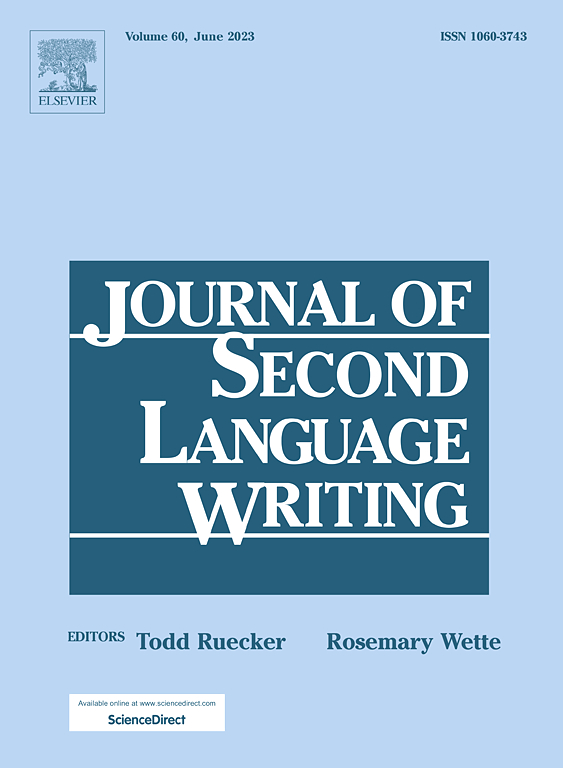数字协作写作干预能否促进二语学习者的写作表现和协同调节学习:一种混合方法设计
IF 4.5
1区 文学
Q1 LINGUISTICS
引用次数: 0
摘要
本研究以社会文化理论为基础,采用解释顺序混合方法研究数字协作写作(CW)对中国英语学习者写作发展的语言影响,以及对共同调节学习集体策略(CoRL)的非语言影响。来自中国一所大学的两个完整的英语学习者班级被分为实验组(n = 34)和对照组(n = 42)。在15周的时间里,实验组通过在线平台Shimo进行CW干预,而对照组则单独完成相同的写作任务。写作前和写作后测试使用分析评分标准和细粒度的复杂性、准确性和流畅性指标来检查英语学习者的写作发展。采用自述式问卷调查学习者在合作过程中的外语学习策略。我们对实验组的12名学生进行了两次任务后访谈,以深入了解在数字工具的支持下连续学习的效果。定量结果显示,实验组在整体写作得分和语言准确性方面优于对照组。与对照组相比,他们还报告了CoRL策略水平的提高。定性研究结果表明,数字连续语对提高写作水平起到语言中介作用,并为促进同伴间的共同调节提供了社会和元认知框架。研究结果表明,社会互动和集体搭建能够促进二语学习者的认知和心理发展。本文章由计算机程序翻译,如有差异,请以英文原文为准。
Can digital collaborative writing intervention promote L2 learners’ writing performance and co-regulated learning: A mixed-methods design
Grounded in sociocultural theory, this intervention study adopted an explanatory sequential mixed-methods approach to examine the linguistic effect of digital collaborative writing (CW) on Chinese English as a foreign language (EFL) learners’ writing development and the non-linguistic effect on their collective strategies for co-regulated learning (CoRL). Two intact classes of EFL learners from a Chinese university were assigned to either an experimental group (n = 34) or a control group (n = 42). Over 15 weeks, the experiment group attended a CW intervention via the online platform Shimo, while the control group completed the same writing tasks individually. Pre- and post-writing tests were used to examine EFL learners’ writing development using an analytic scoring rubric and fine-grained indices of complexity, accuracy, and fluency. Self-report questionnaires were employed to investigate learners’ CoRL strategies during collaboration. Two post-task interviews were conducted with 12 students from the experimental group to gather in-depth insights into the effect of CW with the affordance of digital tools. Quantitative results revealed that the experimental group outperformed the control group in overall writing scores and linguistic accuracy. They also reported an increased level of CoRL strategies compared to the control group. Qualitative findings elucidated that digital CW served as linguistic mediation for promoting writing proficiency and provided social and meta-cognitive scaffolding for fostering co-regulation among peers. The findings reveal that social interactions and collective scaffoldings can promote L2 learners’ cognitive and psychological development.
求助全文
通过发布文献求助,成功后即可免费获取论文全文。
去求助
来源期刊

Journal of Second Language Writing
LINGUISTICS-
CiteScore
8.80
自引率
13.10%
发文量
50
审稿时长
59 days
期刊介绍:
The Journal of Second Language Writing is devoted to publishing theoretically grounded reports of research and discussions that represent a significant contribution to current understandings of central issues in second and foreign language writing and writing instruction. Some areas of interest are personal characteristics and attitudes of L2 writers, L2 writers'' composing processes, features of L2 writers'' texts, readers'' responses to L2 writing, assessment/evaluation of L2 writing, contexts (cultural, social, political, institutional) for L2 writing, and any other topic clearly relevant to L2 writing theory, research, or instruction.
 求助内容:
求助内容: 应助结果提醒方式:
应助结果提醒方式:


